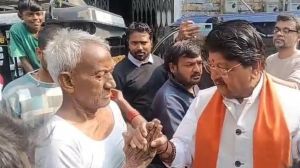Stay updated with the latest - Click here to follow us on Instagram
Active Voice
Sanjay Maharishi believes in learning on the job,and using the knowledge to the best advantage.
Sanjay Maharishi uses his documentaries as a platform for social commentary
Sanjay Maharishi believes in learning on the job,and using the knowledge to the best advantage. Only interaction and intervention with things around us can deliver the real picture. Reading alone cannot fill the void, says the documentary film-maker,in town for the Chandigarh Arts and Heritage Festival,where three of his films on theatre are being screened.
The films,based on the lives of three theatre directors,proved to be a unique experience for Maharishi. They were diametrically opposite to each other, notes Maharishi,who says it brought an interesting perspective to train the camera on another director. While one director,Ovlya Kuli,brought with him the European-Middle East Islamic influences,Grotowski Workshop from the Polish Grotowski Institute devised training exercises for an actor originating from traditional funeral singing in Polish village. The third in the trilogy is Orissa-based director,Robin Dass work, he reflects. Maharishi shot the making of a play in all the three films,and was later commissioned by the National School of Drama (NSD),Delhi to do the same. Theatre usually has recordings and photographs as study material. The movies will act as a visual document of how a play is conceptualized and translated on stage, he says.
After starting off as a cinematographer,Maharishi realised he was not meant for the commercial sector. The ground realities were missing,and I couldnt continue,so I decided to shift to documentaries, he says. From capturing the anomalies in water distribution in Rajasthan in 1991 to working on traveling documentaries on human rights,health and social issues with the UN,Maharishi has been on the road for quite a while. There is a huge demand for documentaries now. Small festivals are cropping up all over,like one in Gorakhpur and Karimnagar. There are works focussing on Maoists,farmer suicides,foeticide,transgenders and sexuality,and thanks to the digital format,its got cheaper too, he quips.







